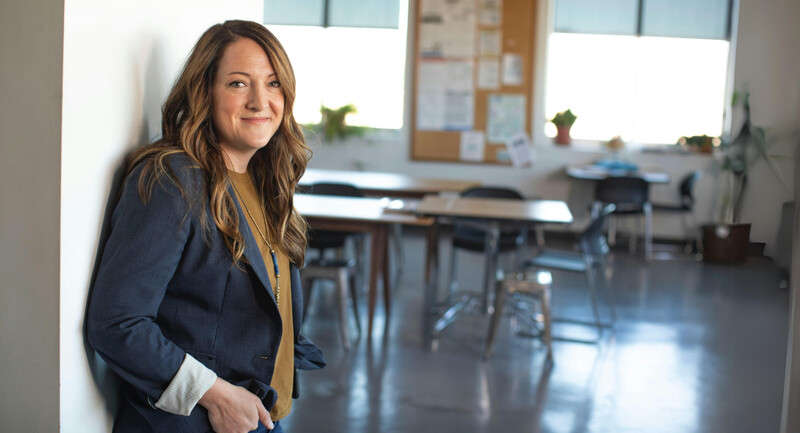When I first became a literacy coach back in 2014, I was haunted by two minor questions: What does it mean to be a literacy coach, and what would I do as a literacy coach? Several years have passed, and I am still searching for answers to these exact questions. If a literacy coach helps teachers implement research-based (by whom?) best practices (for whom?) for students to grow as literate beings (as defined by whom?), this job is slightly more complicated than mere definitions make it seem.
Literacy isn’t just about letters, sounds, and words: it is about making meaning in the world (Freire & Macedo, 1987). All of us carry different cultural experiences, socializations, and norms that build our worlds and affect how we construct meaning. For example, as a White, middle-class, Christian female, my cultural norms provide me with an “invisible knapsack” (McIntosh, 1990) of privileges that affect how I construct meaning in the world every day, usually without my even realizing it. In my experience, we don’t talk about this kind of culture enough in education. Culture isn’t just food, holidays, and languages. Culture also includes values, traditions, unspoken rules and norms, and other elements that affect our lives (sometimes invisibly!) on a daily basis—including our teaching lives, which in turn affects our students, families, co-workers, and other stakeholders.
The role of a literacy coach transcends improving teachers’ literacy practices and students’ learning outcomes; a coach is a public intellectual who inhabits a political space (Commeyras, 2002; Dozier, 2014). Furthermore, literacy coaches can use their position to advocate for students and groups that are minoritized or underrepresented (Jones & Rainville, 2014). In data meetings, conversations, and other encounters as a literacy coach, I heard numerous deficit-based comments from educators about these underrepresented groups, groups that often didn’t share the cultural background of the teachers based on factors including (but not limited to) race, socioeconomic status, religion, sexual orientation, family structure, and language. But why are differences often conflated with deficits? If students enter school with cultural knowledge and skills that do not align with those of their classroom teacher, are these truly deficits or simply differences? How could I coach teachers to see these differences as strengths, not as deficits?
To delve deeper into these questions, I designed a new type of coaching: critical coaching. (It actually became the topic of my dissertation [Wells, 2017].) To develop this model, I built a critical coaching partnership with Kadence (pseudonym), an early childhood educator at my school. Our goal was to reflect on our own cultural norms and then take action in our educational settings to make sure that we viewed students’ differences as strengths instead of deficits. We had after school chats every few weeks, in which we explored texts (ranging from academic articles to cartoons to social media posts about current events), analyzed instruction and instructional practices (such as a chart that analyzed voices and perspectives in read-alouds), and discussed observations of students (such as through digital learning communities) and ourselves. These conversations helped us identify the cultural norms, values, and experiences that we carried with us, often invisibly, as White female teachers. Identifying our own culture was an important step to seeing our students’ cultures and funds of knowledge (Moll, Amanti, Neff, & González, 1992) in their own right, instead of holding our own cultural traditions as the invisible norm against which others’ traditions should be judged—thus resulting in hurtful deficit thinking.
During these discussions, some of our covert assumptions surfaced. For example, we both made assumptions about how some of our families who spoke Spanish could participate in learning activities. When I sent home a survey to families, I noticed that closed-response questions that allowed families to choose from a list of provided answers received higher response rates that open-ended questions that required a written response. At first, I thought that this pattern was a result of Spanish-speaking families lacking the literacy skills needed to complete the open-ended questions. However, when I looked back at the surveys, I saw that this trend was consistent among the surveys in Spanish and in English. Similarly, Kadence was very hesitant to involve families in a class pen pal project for fear that some students, especially those whose parents did not speak English, would be unable to participate in the project. Together, we brainstormed a solution of inviting families to communicate however they felt comfortable—in English, in Spanish, in another language, or even with pictures—and getting translation help from one of our biggest assets: multilingual students. We both had made deficit-oriented assumptions which could have very negatively impacted how we engaged families if we had not stopped to reflect on them.
In our critical coaching partnership, we moved recursively between reflection and action, a combination that Freire (1970) called praxis. We took action in many different ways, but two modes that stood out to us were planning culturally relevant pedagogy and speaking up to showcase students’ strengths. Culturally relevant pedagogy embraces the unique sets of experiences and understandings that all students bring to the classroom by “teach[ing] to and through their personal and cultural strengths, their intellectual capabilities, and their prior accomplishments” (Gay, 2010, p. 26). Together, we practiced following students’ personal and cultural strengths when planning instruction. For example, the class pen pal project evolved during a life cycle unit because we realized students had ample experiences of being allowed (and, perhaps more significantly, not allowed) to do certain things because of their age, and we invited students to engage families in dialogue about this topic through letter writing. Secondly, speaking up to showcase students’ strengths amidst deficit-oriented perspectives was (and continues to be) difficult work. In multiple instances, we have been audiences to comments that were deficit-oriented toward students and families. These comments were often made with the assumption that we shared these same deficit beliefs; however, we did not, and we realized the real damage such assumptions can have as they weave their way into pedagogy and interactions with students and families. We used our critical coaching partnership and other resources, such as this Speak Up at School resource from Teaching Tolerance, to help us advocate for and highlight the strengths of students and families.
I believe critical coaching offers ample opportunities for transformative praxis (Freire, 1970) that acknowledges the rich diversity of cultures that educators, students, and families contribute to any learning environment. A literacy coach’s job does not lie solely in scaffolding teachers into best practices in literacy; it also lies in the ethical responsibility to help teachers reach all students and families, regardless of their culture—or the teacher’s culture. Being aware of the culture we all bring to learning spaces is an important step away from positioning one culture as the norm, the ruler for and over others, in both measurement and power.
Because, as I said in the opening poem, I am a coach of literacy, words, and all.
Melissa Summer Wells (@mswells01) is an Assistant Professor of Education at the University of Mary Washington in Fredericksburg, VA. She has experience as a 3rd grade teacher, a kindergarten teacher, and a literacy coach. She completed her Ph.D. in Language and Literacy from the University of South Carolina in 2017. Her research interests include coaching teachers into culturally relevant teaching and designing dialogic learning communities with families. Wells was a 2015 South Carolina ASCD Emerging Leader, 2016 ASCD Emerging Leader, and was named to the International Literacy Association (ILA)’s “30 Under 30” list in 2016.








